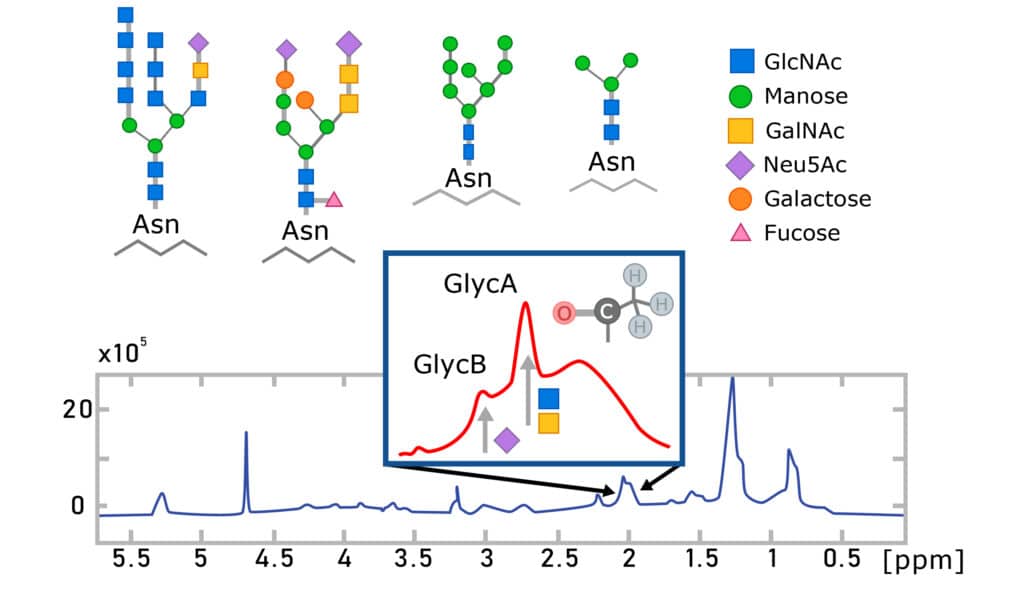Glycoproteins: Emerging Markers of Inflammation
Cardiovascular events occur despite the control of conventional risk factors. Inflammation plays numerous roles in the pathogenesis of atherosclerotic cardiovascular disease. As an alternative to traditional inflammatory markers, new biomarkers of systemic inflammation, including Glyc-A and Glyc-B measured by nuclear magnetic resonance (NMR), have been explored.
Especially, the concentration of Glyc-A has been associated as a biomarker of systemic inflammation, quantifying both protein concentrations and glycosylation states of various acute-phase proteins. Specifically, the NMR signal of Glyc-A arises from glycosylated proteins synthesized in the liver. Proteins circulating in concentrations high enough to contribute significantly to the Glyc-A signal are late-phase acute reactants: alpha-1 acid glycoprotein, haptoglobin, alpha-1-antitrypsin, alpha-1-antichymotrypsin, and transferrin[1].
Furthermore, it has been demonstrated that the concentration of Glyc-A is higher in chronic inflammatory diseases[2,3], potentially better reflecting a systemic acute-phase response than any single glycoprotein component, as it is a stable composite marker over time and, therefore, exhibits lower intra-individual variability[4]. In addition to proving to be a marker of systemic inflammation, the concentration of Glyc-A correlates with the characteristic inflammation associated with cardiometabolic risk factors, obesity, insulin resistance, and metabolic syndrome. Therefore, in chronic inflammatory diseases with persistent low-grade inflammation, Glyc-A could function as a biomarker for both systemic disease activity and cardiometabolic risk.
Glyc-A has been shown to be associated with both subclinical atherosclerosis[5] and cardiovascular disease[6]. Glyc-A levels are higher in acute and chronic inflammation, where specific Glyc-A acute-phase reactant proteins undergo changes in circulating concentration and glycosylation pattern. Additionally, elevated levels of Glyc-A have been associated with a higher risk of cardiovascular events, independently of traditional risk factors[7], and the high-sensitivity C-reactive protein biochemical inflammation biomarker[8].
Obtain the inflammatory profile through the Liposcale+ test and simultaneously monitor lipid and inflammatory risk in your studies and/or patients!
Want more information? Contact us!

NMR spectrum indicating the inflammation of GlycA and GlycB.
1. Otvos, J. D., Guyton, J. R., Connelly, M. A., Akapame, S., Bittner, V., Kopecky, S. L., … & Boden, W. E. (2018). Relations of GlycA and lipoprotein particle subspecies with cardiovascular events and mortality: a post hoc analysis of the AIM-HIGH trial. Journal of clinical lipidology, 12(2), 348-355.
2. Rodríguez-Carrio, J., Alperi-López, M., López, P., Pérez-Álvarez, Á. I., Gil-Serret, M., Amigó, N., … & Suárez, A. (2020). GlycA levels during the earliest stages of rheumatoid arthritis: potential use as a biomarker of subclinical cardiovascular disease. Journal of Clinical Medicine, 9(8), 2472.
3. Malo, A. I., Rull, A., Girona, J., Domingo, P., Fuertes-Martín, R., Amigó, N., … & Masana, L. (2020). Glycoprotein profile assessed by 1H-NMR as a global inflammation marker in patients with HIV infection. A prospective study. Journal of Clinical Medicine, 9(5), 1344.
4. Connelly, M. A., Gruppen, E. G., Otvos, J. D., & Dullaart, R. P. (2016). Inflammatory glycoproteins in cardiometabolic disorders, autoimmune diseases and cancer. Clinica Chimica Acta, 459, 177-186.
5. Tibuakuu, M., Fashanu, O. E., Di, Z. H. A. O., Otvos, J. D., Brown, T. T., Haberlen, S. A., … & MICHOS, E. D. (2019). GlycA, a novel inflammatory marker, is associated with subclinical coronary disease in the multicenter AIDS cohort study. AIDS (London, England), 33(3), 547.
6. Cediel, G., Teis, A., Codina, P., Julve, J., Domingo, M., Santiago-Vacas, E., … & Bayés-Genís, A. (2022). GlycA and GlycB as inflammatory markers in chronic heart failure. The American Journal of Cardiology, 181, 79-86.
7. Connelly, M. A., Otvos, J. D., Shalaurova, I., Playford, M. P., & Mehta, N. N. (2017). GlycA, a novel biomarker of systemic inflammation and cardiovascular disease risk. Journal of translational medicine, 15(1), 1-5.
8. Akinkuolie, A. O., Glynn, R. J., Padmanabhan, L., Ridker, P. M., & Mora, S. (2016). Circulating N‐linked glycoprotein side‐chain biomarker, rosuvastatin therapy, and incident cardiovascular disease: An analysis from the JUPITER trial. Journal of the American Heart Association, 5(7), e003822.


